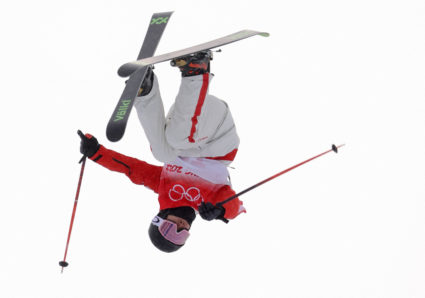
The Alvin Ailey American Dance Theater has just launched a 20-city U.S. tour under its new artistic director Alicia Graf…

BEIJING (AP) — For two weeks and more, China's stance on questions about its politics and policies has been straightforward: It's the Olympics, and we're not talking about these things.
That changed Thursday at the Beijing organizing committee's last regularly scheduled daily news conference, three days before the end of the Games. The persistent and polite refusal to answer such questions gave way to the usual state of affairs at news conferences with Chinese officials — emphatic, calibrated answers about the country's most sensitive situations.
WATCH MORE: Racism, human rights: Allegations mar marquee sporting events
Taiwan? An indivisible part of China. The Uyghur population of the Xinjiang region? Not being pushed into forced labor. China's sovereignty? Completely unassailable under international norms.
"What I want to say is that there is only one China in the world," organizing committee spokeswoman Yan Jiarong said, calling it "a solemn position" for China. She referred to other assertions about China's treatment of Uyghurs and living conditions in the northwestern region of Xinjiang as "based on lies."
It was only a matter of time before these topics burst at the seams. The run-up to the Games was overshadowed by a diplomatic boycott led by the United States, which centered on China's human rights record; China was determined to keep the focus only on sports but is also very committed to vigorously defending its stances publicly.
In the final regularly scheduled briefing before the Games close on Sunday, Yan and IOC spokesman Mark Adams were peppered with questions about Taiwan, Xinjiang, and the safety of Chinese tennis player Peng Shuai.
Following up on a question about Taiwan's reported attempt to skip the opening ceremony, Yan asked for extra time to address the status of the self-governing island, which China views as its sovereign territory.
She often opened in English but switched to Chinese to make key points, rendered in English by an interpreter.
"Mark, could I just make some supplementary remarks?" Yan said in English. Then, shifting to Chinese: "Taiwan is an indivisible part of China and this is a well recognized international principle and well recognized in the international community. We are always against the idea of politicizing the Olympic Games."
Adams was immediately questioned by a non-Chinese reporter who suggested that Yan, herself, had "politicized" the Games by raising China's stance on Taiwan. Adams dodged the question.
"There are views on all sorts of things around the world, but our job is to make sure that the Games take place," Adams said.
WATCH MORE: At the 2022 Winter Olympics, 'a lot of pressure and high hopes'
A Games volunteer, a young Chinese graduate student, got a question she did not expect when a reporter asked if she knew who Chinese tennis player Peng Shuai was and, further, did she believe Peng was safe.
Peng, once the world's top-ranked doubles player, three months ago accused a former high-ranking politician of sexual assault. Peng's comments were immediately scrubbed from China's censored internet.
"Well, I am sorry," the young woman replied. "I don't really know that."
One reporter asked Adams directly about the IOC's position on the reported existence of "concentration camps" in Xinjiang, and whether China was using forced labor there. Adams suggested the question was not "particularly relevant' to the briefing, and then went on to praise the power of the Olympics to unite people.
Yan again made sure China's view was heard.
"I think these questions are very much based on lies," she said. "Some authorities have already disputed this false information. There is a lot of solid evidence. You are very welcome to refer to all that evidence and the facts."
Yan had a similar response when a reporter asked Adams if IOC uniforms and other IOC garments were produced by Uyghur labor — or from Xinjiang cotton.
"None of the production took place in Xinjiang, nor any of the input of raw materials comes from that region," Adams said.
READ MORE: UN labor agency cites concerns about Uighurs, other minorities in China's Xinjiang region
Yan added: "I think the so- called forced labor in Xinjiang are lies made up by deliberate groups. And the relevant organizations have provided a large amount of facts to dispute that. And we are against the politicization of sports."
For the second straight day, details were also sought and not given about a Japanese reporter's assertion that she was prevented by an organizing committee staffer from asking questions to an Alpine skier from Hong Kong.
China is actively suppressing pro-democracy groups in Hong Kong.
The Olympic Charter ensures athletes' right to express opinions in venue interview areas. Yan maintained that Beijing organizers would "protect the freedom of speech of all participants."
Sustain our coverage of culture, arts and literature.